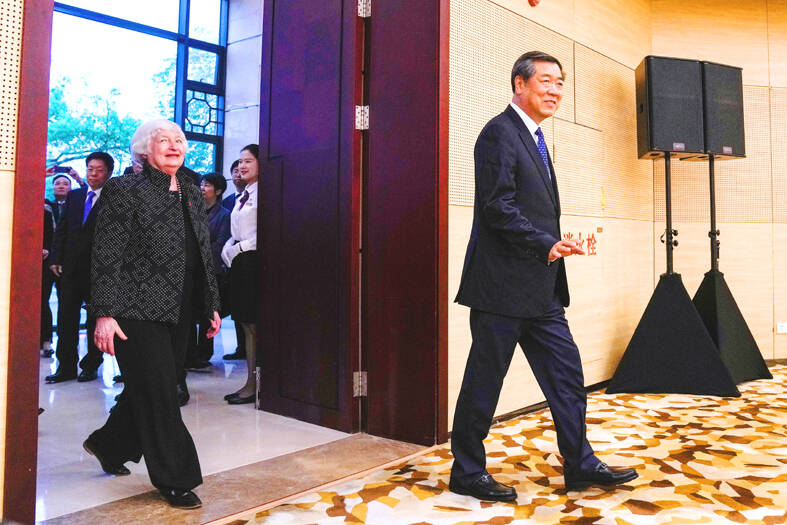US Secretary of the Treasury Janet Yellen yesterday warned during a visit to China that Beijing’s subsidies for industry could pose a risk to global economic resilience.
Yellen arrived in Guangzhou on Thursday for several days of talks with Chinese officials on her second visit to the world’s second-largest economy in less than a year.
She expressed concerns about China’s “overcapacity” undercutting companies in the US and elsewhere.

Photo: EPA-EFE
Such overcapacity is seen as a result of huge Chinese subsidies to industries, such as solar, electric vehicles (EV) and batteries, that risk creating a surplus of cheap goods that threatens those sectors elsewhere.
“Direct and indirect government support is currently leading to production capacity that significantly exceeds China’s domestic demand, as well as what the global market can bear,” she told a gathering of the US business community. “Overcapacity can lead to large volumes of exports at depressed prices and it can lead to overconcentration of supply chains, posing a risk to global economic resilience.”
Such fears are not part of an “anti-China policy,” she said during a question-and-answer session after the speech, but are intended to mitigate risks from “inevitable global economic dislocation that will result” from no change in Chinese policies.
Yellen also told the gathering, organized by the US Chamber of Commerce in China, that she would seek to raise with Chinese officials the “challenges” faced by US businesses operating in the country.
That included Beijing “imposing barriers to access for foreign firms and taking coercive actions against American companies,” she said.
“This doesn’t only hurt these American firms. Ending these unfair practices would benefit China by improving the business climate here,” Yellen said.
Yellen then met with Chinese Vice Premier He Lifeng (何立峰), who said he looked forward to “further in-depth discussions on important issues to China, the United States and the global economic and financial arena.”
He also said they would seek to “provide appropriate responses to key concerns in China-US economic relations.”
“It is hoped that both sides will achieve new mutually beneficial and win-win outcomes,” he added.
The two sides then began closed-door talks, which the US has said would see the two dive deep into both countries’ economic situations as well as address more sensitive areas such as national security and Beijing’s alleged support for Russia’s defense industrial base.
Yellen in the morning told the governor of Guangdong that the US was committed to a “healthy economic relationship.”
However, that required “a level playing field for American workers and firms,” she added.
Beijing has dismissed concerns over its state support for industry, last month condemning an EU probe into its subsidies for EVs as “protectionism” and part of a Western effort to politicize international trade.
Washington’s worries about a flood of exports come as US President Joe Biden pushes to boost domestic manufacturing in clean energy, with policymakers warning that China’s excess capacity could harm the growth of those industries.

SEEKING CLARITY: Washington should not adopt measures that create uncertainties for ‘existing semiconductor investments,’ TSMC said referring to its US$165 billion in the US Taiwan Semiconductor Manufacturing Co (TSMC, 台積電) told the US that any future tariffs on Taiwanese semiconductors could reduce demand for chips and derail its pledge to increase its investment in Arizona. “New import restrictions could jeopardize current US leadership in the competitive technology industry and create uncertainties for many committed semiconductor capital projects in the US, including TSMC Arizona’s significant investment plan in Phoenix,” the chipmaker wrote in a letter to the US Department of Commerce. TSMC issued the warning in response to a solicitation for comments by the department on a possible tariff on semiconductor imports by US President Donald Trump’s

‘FAILED EXPORT CONTROLS’: Jensen Huang said that Washington should maximize the speed of AI diffusion, because not doing so would give competitors an advantage Nvidia Corp cofounder and chief executive officer Jensen Huang (黃仁勳) yesterday criticized the US government’s restrictions on exports of artificial intelligence (AI) chips to China, saying that the policy was a failure and would only spur China to accelerate AI development. The export controls gave China the spirit, motivation and government support to accelerate AI development, Huang told reporters at the Computex trade show in Taipei. The competition in China is already intense, given its strong software capabilities, extensive technology ecosystems and work efficiency, he said. “All in all, the export controls were a failure. The facts would suggest it,” he said. “The US

The government has launched a three-pronged strategy to attract local and international talent, aiming to position Taiwan as a new global hub following Nvidia Corp’s announcement that it has chosen Taipei as the site of its Taiwan headquarters. Nvidia cofounder and CEO Jensen Huang (黃仁勳) on Monday last week announced during his keynote speech at the Computex trade show in Taipei that the Nvidia Constellation, the company’s planned Taiwan headquarters, would be located in the Beitou-Shilin Technology Park (北投士林科技園區) in Taipei. Huang’s decision to establish a base in Taiwan is “primarily due to Taiwan’s talent pool and its strength in the semiconductor

French President Emmanuel Macron has expressed gratitude to Hon Hai Precision Industry Co (鴻海精密) for its plan to invest approximately 250 million euros (US$278 million) in a joint venture in France focused on the semiconductor and space industries. On his official X account on Tuesday, Macron thanked Hon Hai, also known globally as Foxconn Technology Group (富士康科技集團), for its investment projects announced at Choose France, a flagship economic summit held on Monday to attract foreign investment. In the post, Macron included a GIF displaying the national flag of the Republic of China (Taiwan), as he did for other foreign investors, including China-based